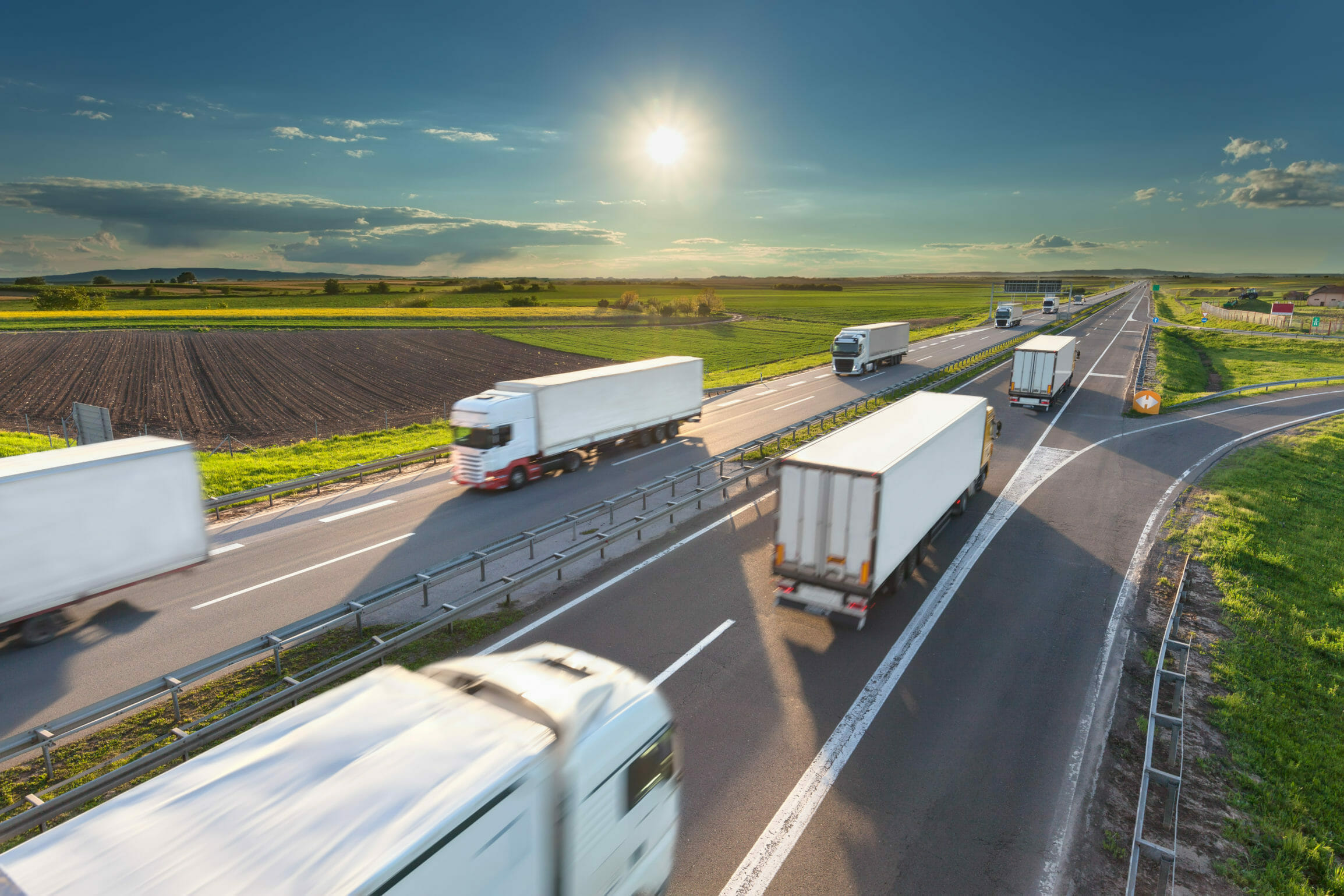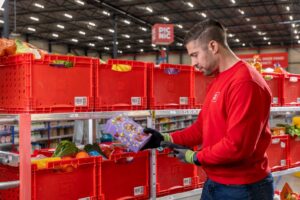There is a revolution slowly occurring in the trucking industry. With 22% of US freight consisting of agricultural products and 76% of domestic agricultural products transported by truck, this stands to have a big effect on the food and agriculture industry.
Currently, the US trucking industry is an intensely complicated, decentralized network of drivers, brokers and commercial fleets without standardized pricing or aggregation.
This means there are multiple layers of middlemen, offering next to no transparency or visibility on how goods are moved. The fragmentation of the trucking industry also means that everyone is working with multiple carriers, as the top 20 asset carriers only own about 12% of the physical trucks. The average fleet size in America is five trucks.
For a fruit growing operation, like Borton Fruit in Yakima, Washington, that means that when it is time to hire a truck to deliver its crop to customers, Borton makes phone calls, sends emails, and even faxes to brokers and owner/operators to try and book appropriate drivers. The assigned driver shows up and hauls the load and the shipper has no way of tracking it until it gets to its destination.
For a crop with a short season and short shelf-life, this is a high-stakes process.
“During cherry season, one day can be the difference between good cherries in the store and defects starting to show in the store,” said Sky Johnson of Borton Fruit, a grower of apples, pears, and cherries.
Johnson says that the apple season getting started now is predicted to compete with Washington state’s best ever – the estimates are around 130 million bushels. With such an intensive harvest period — roughly twelve weeks — the opacity of the trucking availability means dollars and cents.
“The apple shippers out here find gaps in trucking availability frequently. Especially during the Christmas tree season when refrigerated trucks hauling trees absorb any surplus of trucks and erode the availability of apple truckloads getting out,” said Johnson. “As we look to the next five years of apple and cherry production in Washington, the gross production will continue to grow, creating more pressure on the supply chain.”
Growers can not only lose out on premium margins with old-school trucking, but farms will have to hire someone to wait with the crop until a truck arrives, which can take hours.
Enter Convoy
Convoy is one of the largest of a relatively new wave of startups that are trying to disrupt the status quo in trucking with software programs and apps that aim to imitate the Ubers and Lyfts of the taxi world.
And it has attracted some impressive investors recently, including Amazon CEO Jeff Bezos, billionaire Barry Diller, LinkedIn founder Reid Hoffman, and Bill Gates when it raised $62 million in a Series B round in June led by accelerator Y Combinator.
Convoy considers itself an “automated freight brokerage” today after moving away from the “uber for trucking” descriptor that lost its appeal in the wake of Uber’s many controversies, said Convoy CEO Dan Lewis to The Verge.
Convoy is an app and a service, much like Uber, but with more specificity and higher stakes. The app uses an algorithm to match a load, the size, distance, destination, and items being hauled with drivers who are looking for these parameters. The app learns about drivers and over time offers them loads that are supposedly more and more ideal.
By making GPS tracking available to shippers, presenting all pricing and fees up front, using algorithms to match drivers to the kinds of loads they like to haul, and shippers to the kinds of trucks they need, Convoy is attempting to take the anxiety out of trucking for both sides of the equation.
In terms of attracting carriers, Janelle Stewart, Convoy’s business development director says that the company’s algorithm learns what loads and trips they like and offers them more and more relevant haul over time.
“We give them loads that match what they want to do, where do they like to run, and where can we give them round trips. Machines can optimize better than humans can,” she said.
Customers so far include Unilever, Anheuser-Busch, and Niagara Water.
Johnson is excited about the increased flexibility and transparency Convoy can provide. “The biggest foreseeable benefit of what Convoy is working to achieve is bringing the visibility of those “extra” trucks that will be needed to keep the domestic and export distribution of apples, pears, and cherries flowing,” he told AgFunderNews.
Johnson is particularly excited for Convoy’s potential solution for less-than-load (LTL) situations, where a truck is not full or is returning to its origin completely empty.
“LTL loads are nearly impossible to arrange for produce out of Washington today,” he said.
According to Stewart, 40% of the trucks on the road are empty. “If we can make even 1% of difference in that optimization, we could have a significant impact on the economy in general.”
Trucking Tech Picking Up
Despite its young age, Convoy is well-funded and has raised $80.5 million in three rounds since its founding in 2015.
And it looks like investment for trucking startups will grow as CB Insights predicts that this will be the first $1 billion year for this essential sector.
In the world of freight-hauling, Convoy is seeing competition from Uber Freight, which just launched in May (and declined to comment for this story). The service has expanded from its initial market Texas to now cover major metro areas in California, Arizona, Chicago, Georgia, South Carolina and North Carolina in August.
Major internal infrastructure for Uber Freight was attained through an acquisition of Chicago-based trucking brokerage 4Front Logistics. The company also purchased autonomous truck startup Otto for $680 million, but progress there has apparently stalled after Google accused Otto’s CEO (and former googler) of stealing the basis for Otto’s truck from Google. The trial begins next month.
Progress on Uber’s autonomous truck has been reportedly been floundering since, but executives other than the recently departed CEO Travis Kalinak, claim that Uber Freight is full steam ahead. In fact, newly appointed Uber CEO Dara Khosrowshahi is an investor in Convoy and may have to divest due to the conflict of interest presented by his new position.
Spanish OnTruck, a similar on-demand trucking app covering the European market, has a former Delivery Hero VP as chief technology officer. OnTruck raised a $10 million Series A Round in May, led by British tech VC Atomico and French private equity firm Idinvest Partners.
Other US startups in a similar vein are Transfix, which is moving away from a “matching” model to a marketplace model for connecting carriers and shippers. Transfix raised a $42 million Series C round lead by Bowery Capital.
Stewart also mentioned that Convoy is contending with “drop-shipping” schemes as well, where a company drops off and then picks up a container to truck to its destination. TruckerPath is also working in this space along with creating other tools for truckers. The Mountain View, CA-based startup raised a $30 million debt facility in June bring its total funding to $51.5 million
Winners and losers will likely be determined by which startups are able to deliver on their promise of truly making hiring freight easier and more dependable. As with ride-hailing, it will most likely come down to the experiences of individual customers in choosing which app they use most frequently; geographically will also be a major restriction.
Brian Rogers accelerator lead at the Fedex-sponsored Epicenter Logistics Accelerator in Memphis told AgFunderNews, “I think we are closer to the beginning than the middle of the trajectory of new technology penetration into these markets,” said Rogers of both Uber Freight and Convoy.
Rogers said that the fact that trucking is decentralized and largely not digitized may slow down the adoption or penetration of these new technologies, but the talent and the innovation is there. “The indications and innovation pipelines we see first-hand are strong on future opportunities in both industries, independently and in crossover areas,” said Rogers.
There are a lot of transitions happening in trucking right now that could make the customer experience better for those hiring freight. But a more efficient trucking system may be able to allow food companies and growers to hold onto more margin. Said Johnson, “Convoy and the digital-logistics movement will bring orders of magnitude of improvements to an industry that has not evolved since the inception of fax & email.”





